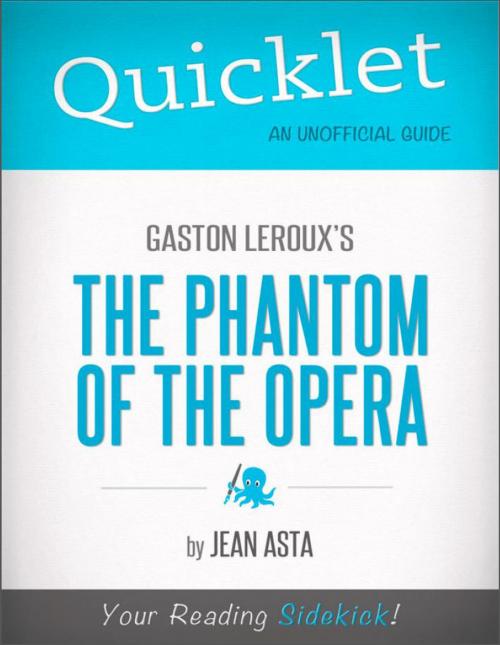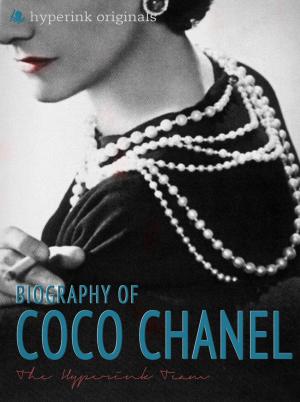Quicklet on Gaston Leroux's The Phantom of the Opera (CliffsNotes-like Summary, Analysis, and Commentary)
Nonfiction, Reference & Language, Study Aids, Book Notes, Art & Architecture, General Art| Author: | Jean Asta | ISBN: | 9781614640332 |
| Publisher: | Hyperink | Publication: | March 2, 2012 |
| Imprint: | Hyperink | Language: | English |
| Author: | Jean Asta |
| ISBN: | 9781614640332 |
| Publisher: | Hyperink |
| Publication: | March 2, 2012 |
| Imprint: | Hyperink |
| Language: | English |
ABOUT THE BOOK
In my elementary school, the library had a small section dedicated to children’s versions of classic novel adaptations. Even now, I can remember that my favorite adaptation was “The Phantom of the Opera.” The translation was a watered-down version with plenty of pictures, and I was intrigued by the mysterious ‘Angel of Music’ who enchanted the pretty little Christine Daaé. This gentleman could throw his voice as if to sound disembodied, he taught Christine to sing, and he loved her fiercely and passionately.
The phantom’s story stayed with me until my freshman year at high school, when much to my delight, I saw Andrew Lloyd Webber’s musical adaptation as my first Broadway production. I bought the original score book (which I still possess years later), and kept the entire bus awake by singing the haunting music throughout the fourteen-hour ride back home.
MEET THE AUTHOR
Jean Asta is the owner of Asta Communications, a freelance communications company providing writing, editing, and training services for clients around the globe. She has a BA in English Literature and a Master's in Public Administration, both from the University of Georgia.
EXCERPT FROM THE BOOK
“The Phantom of the Opera” was inspired by a corpse that Leroux chanced upon in the catacombs of the Opera House in Paris while working on a story about the prisoners of the Paris Commune held there. The expansive underground structures beneath the Paris Opera House, kindled his imagination, and Leroux was able to unleash a passionate tale of misguided and unrequited love.
As a book, the “Phantom of the Opera” received very little literary praise. Critics and readers enjoyed the suspense, but they found the story implausible, and the plot convoluted. It wasn’t until 1925, when Universal Studio made a silent film version of the novel casting Lon Cheney as the Phantom, that his story started getting popular attention. The cinematic phantom was so gruesome that women were forewarned to bring smelling salts to the theater lest they faint, and quite a few members of the audience did...
Buy a copy to keep reading!
ABOUT THE BOOK
In my elementary school, the library had a small section dedicated to children’s versions of classic novel adaptations. Even now, I can remember that my favorite adaptation was “The Phantom of the Opera.” The translation was a watered-down version with plenty of pictures, and I was intrigued by the mysterious ‘Angel of Music’ who enchanted the pretty little Christine Daaé. This gentleman could throw his voice as if to sound disembodied, he taught Christine to sing, and he loved her fiercely and passionately.
The phantom’s story stayed with me until my freshman year at high school, when much to my delight, I saw Andrew Lloyd Webber’s musical adaptation as my first Broadway production. I bought the original score book (which I still possess years later), and kept the entire bus awake by singing the haunting music throughout the fourteen-hour ride back home.
MEET THE AUTHOR
Jean Asta is the owner of Asta Communications, a freelance communications company providing writing, editing, and training services for clients around the globe. She has a BA in English Literature and a Master's in Public Administration, both from the University of Georgia.
EXCERPT FROM THE BOOK
“The Phantom of the Opera” was inspired by a corpse that Leroux chanced upon in the catacombs of the Opera House in Paris while working on a story about the prisoners of the Paris Commune held there. The expansive underground structures beneath the Paris Opera House, kindled his imagination, and Leroux was able to unleash a passionate tale of misguided and unrequited love.
As a book, the “Phantom of the Opera” received very little literary praise. Critics and readers enjoyed the suspense, but they found the story implausible, and the plot convoluted. It wasn’t until 1925, when Universal Studio made a silent film version of the novel casting Lon Cheney as the Phantom, that his story started getting popular attention. The cinematic phantom was so gruesome that women were forewarned to bring smelling salts to the theater lest they faint, and quite a few members of the audience did...
Buy a copy to keep reading!















